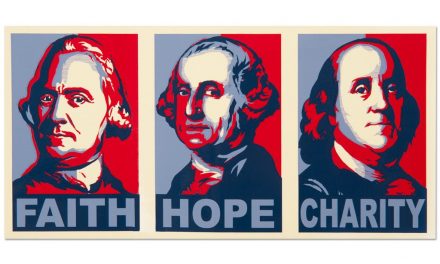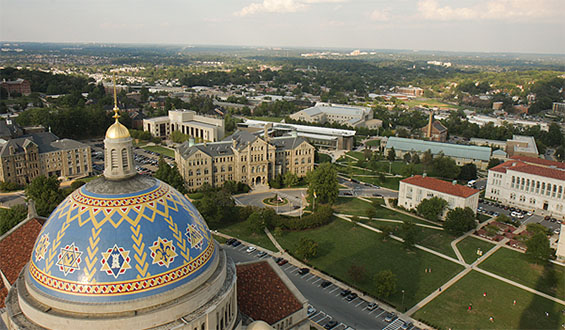The Institute for American Values recently issued A Call for a New Conversation on Marriage. The current conversation, the 74 signers say, is going nowhere and children deserve better. It is not yet clear if Catholics will contribute, but I hope so.
The IAV is a right-leaning, centrist think tank, or at least it used to be. Led by David Blankenhorn, the organization brings scholars together and publishes reports on topics such as, “Why Marriage Matters,” “For a New Thrift,” and “Hardwired to Connect.” It has been in the forefront of efforts to raise concerns about children raised in broken and cohabiting families, and its leaders have sometimes spoken against same sex marriage, though this has not been IAV’s emphasis. (Full disclosure: I was a part of the IAV’s recent “Does the Shape of Families Shape Faith?” project.) But over the summer, Blankenhorn wrote a piece in the New York Times telling readers why he had changed his mind on gay marriage. The organization made a decision that they would welcome gay rights advocates to their pro-marriage work.
As a result of this shift to the center, signers of this statement are a mix of liberals and conservatives interested in talking about marriage because of their concern for children and civil society: Elizabeth Marquardt, Peter Steinfels, Jean Bethke Elshtain, Jonathan Rauch, William Galston, Richard Mouw, Barbara Dafoe Whitehead, Stephen Post, Caitlin Flanagan, Linda Waite, among others.
The call makes five claims:
*We can do something to change the direction of current trends.
*Marriage can “help build affluence,” especially important after the Great Recession.
*The value of marriage throughout the life cycle needs to be explored. Worries about the decline of marriage and the rise of unwed childbearing should not be limited to the young.
*Today’s marriage problem extends to the middle class, dividing those households from upper class households. It is an inequality issue not a poverty issue.
*Most provocatively, “The new conversation does not presuppose or require agreement on gay marriage, but it does ask a new question. The current question is, Should gays marry? The new question is, Who among us, gay or straight, wants to strengthen marriage?”
This last plank will make it difficult for Catholics for join in this movement. Over at First Things, David Mills criticized the statement, saying, “the effort to strengthen marriage while redefining it is ultimately pointless . . . gay marriage is itself one of the problems the Call ought to engage.” Also this week, the Catholic News Service reported, the USCCB filed two amicus briefs in support of California’s Proposition 8 and the Federal Defense of Marriage Act.
Catholics could sit out this conversation and continue to channel most of their pro-marriage energy into fighting same sex marriage. But we would be missing an opportunity to build coalitions with people who are deeply concerned about the 40% of children born outside of marriage, the problems caused by the trend away from marriage in the working class, and the effects of cohabitation on children. Wouldn’t it better to come to the table and join the most promising pro-marriage movement of our day?





Your post prompts me to think of the question my students most often ask about marriage, which strangely echoes David Mills’ point but which comes from a different place, I think. That question is: “What is the point?” (beyond, that is, the point of having a beautiful wedding – that’s my too-cynical thought on it of course). The “What is the point” question I think is driven mostly by the ways sex and children are understood in American culture (because it is plainly evident to them that we don’t need marriage to have children or sex). Gay marriage is only part of that in the sense that the answer most of my students give to “What is the point?” is – “The point is to publicly legitimate peoples’ desires for lifelong relationships in ways that reward them politically and economically.” They wouldn’t use quite that language but that is what it would boil down to, at least in most class discussions.
And if the point is legitimizing relationships, then of course a person or institution’s lack of support for gay marriage is homophobic and that’s what my students readily see.
They get to that point without thinking much at all about the children piece that is the center of several IAV claims – indeed, a claim about children seems antiquated, EVEN in the face of evidence about children’s difficulties in relation to cohabitation and marriage.
I think – based very anecdotally on conversations with fellow parishioners, etc – that many people other than my students, especially in younger generations, follow their argument in favor of gay marriage along the same lines – the point is not gay marriage as such, but a question that doesn’t need to have anything to do with gay marriage: what is the POINT of marriage, regardless of who is getting married?
All of which is to suggest: I think there is ample space for Catholics to engage important questions about children and marriage with groups like IAV even while holding that gay marriage, as Wills has it, would make all marriage seem pointless. That’s because I think that if we can learn to communicate with each other about the “What is the point” question – that also helps nuance debate about gay marriage in helpful ways. I think we have made too many distinctions about marriage in public discourse (gay marriage – yes or no? – gets almost entirely divorced from, ahem, questions about the goodness or badness of divorce) – and gathering up those distinctions and discussing them I think would be very beneficial to everyone.
It seems to me that this debate is over the definition – the meaning – of marriage. If that definition is held to be arbitrary then the term has no inherent meaning and can, and ultimately will, include pretty much every union of which people can conceive. If “The New Conversation on Marriage” includes conceding the point that the definition of marriage is arbitrary then the battle is over and temporary gains along practical lines are ultimately irrelevant.
If it is accepted, however, that the nature of marriage can no more be controlled by legislation than can the tides then discussions such as the one proposed above might be fruitful. I would start any such conversation with this question: do you accept the definition of marriage proposed in “What Is Marriage? Man and Woman: A Defense” by Sherif Girgis, Robert P. George, and Ryan T. Anderson who argue that “marriage is, of its essence, a comprehensive union: a union of will (by consent) and body (by sexual union); inherently ordered to procreation and thus the broad sharing of family life; and calling for permanent and exclusive commitment.”
If the answer to that question is no then further conversation will not merely be useless but will in all likelihood be harmful. I think there are only two possible positions on the meaning of marriage: either it is arbitrary or it is fixed by nature.
I think it would be most ill-advised to “channel most of our pro-marriage energy into fighting same sex marriage”.
Our pro-marriage energy ought to be focused on encouraging and supporting real actual marriages.
I think we can also encourage stability and love in relationships which are not marriage eg friendship, civil unions.
It’s a both/and not an either/or.
God Bless
If gay “marriage” becomes acceptable within the definition of marriage then the game is over: marriage would be nothing more than an arbitrary arrangement defined by the government and there would be no sustainable point at which one could say “this but not that.” There would be little reason not to allow a man to marry his Labrador retriever.
Julie– Timely and important post, and it made me think of a recent Mount faculty seminar I led doing a roundtable on the issue of same-sex marriage. I think I need to do a full post on this. But suffice it to say, there are a lot of folks who are both pro-marriage (in the sense that they have anxieties about various problems in our society today related to promiscuity, pornography, out-of-wedlock childbirth, etc.) and pro-gay-marriage. A lot. So I think this group represents a novel repositioning in this debate. Ender’s comment highlight perhaps the deeper challenge: is there a common description of marriage that they share? I suppose it would have to be: lifelong monogamous mutual fidelity, at least as an ideal. (This would rule out the dog, since there’s no possibility of mutuality in the understood sense) But to what are these folks appealing to defend lifelong monogamous mutual fidelity as a norm?
Julie, Thanks for your post and I think that David rightly the names the conversation we need to be having. Millennials are in large part – pro marriage and pro gay marriage. Their debate and issues are different from the ones dominating the public conversation now.
And herein lies the main problem with Ender’s comment….it belittles and does not take seriously the arguments made by those who are talking about lifelong monogamous fidelity. Framing the argument in that way – nature or arbitrary and if its arbitrary then why not marry your dog? is not just an unhelpful way to have a conversation about marriage it is not a new response to a changing conversation about marriage either. A brief internet search reveals just how the same extreme arguments were made about interracial marriage……
As the news editor I would like to make a friendly interjection here to make sure we don’t veer off into a discussion that will take us away from the point of Julie’s post. Hers would not a post about gay marriage. Rather, it is a post about a specific attempt to have a new conversation on valuing marriage that avoids the whole gay marriage debate. Let us stay on that point, please.
Meghan: My comment was extreme for a purpose and that purpose was not to belittle the concept of gay marriage by comparing it to the marriage of a man and a dog. It was to reinforce my point about the meaning of marriage: that it is either fixed by nature or fixed by nothing more than the opinions of legislators.
Take David’s definition that marriage include a commitment to “lifelong monogamous mutual fidelity.” These might represent ideals but why should they be requirements? In fact given what we know of divorce rates how can we include “lifelong” when in large measure we don’t have that today? Why monogamous? History is littered with examples of polygamous and polyandrous relationships – how can we arbitrarily disallow them?
On what grounds other than arbitrary ones do we draw any line defining what a marriage may not be? Who is hurt if I want to marry my Lab? How is my relationship any of your business? Your marriage is unchanged by my actions so how can you limit what I do simply because you disapprove of it? These are the arguments that will inevitably be raised and I don’t think there is a way to rebut them once you have accepted that marriage may be defined however we like.
Thanks to all for these comments. The Call claims, “The new conversation does not presuppose or require agreement on gay marriage, but it does ask a new question.” Not everyone will accept those terms. From my perspective, we can’t afford to wait for agreement on marriage. There is too much suffering that could be avoided if people who care about children work together on providing more stable environments for parenting. This is not all that the church wants, and it is not all that I want. But in the public life, I believe that our best hope is to cobble together conversations across all kinds of lines, looking for common ground, in order to make things a little better than they currently are. And perhaps, as Jana suggests, that engagement will prepare us to tackle larger questions.
Related: http://thejesuitpost.org/site/2013/02/worth-reading-the-french-bishops-on-love-and-gay-marriage/?utm_source=tjpo.st&utm_medium=urlshortener